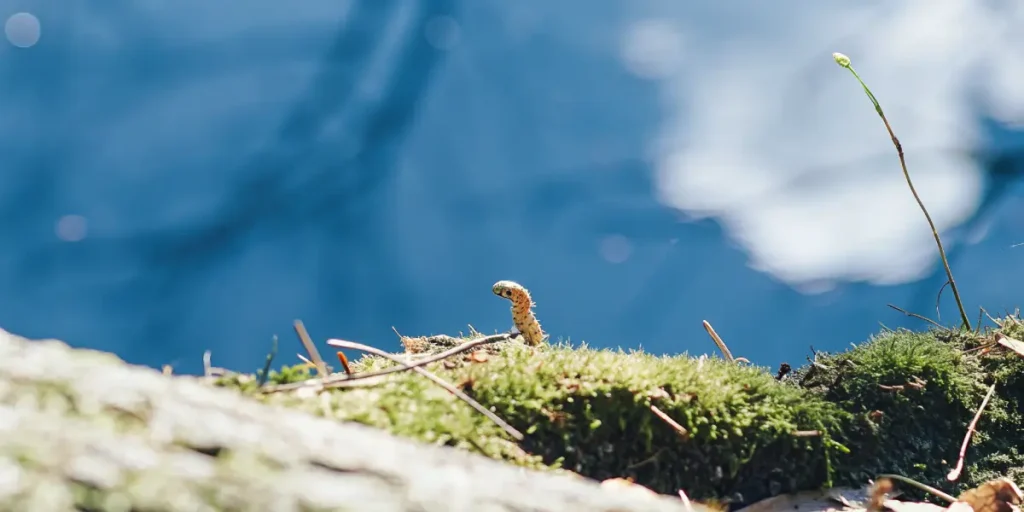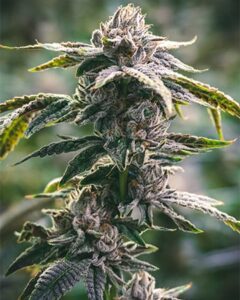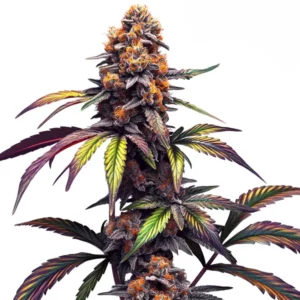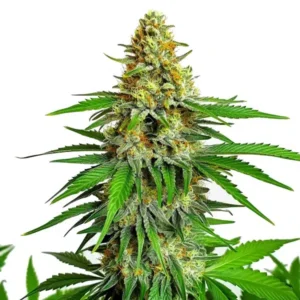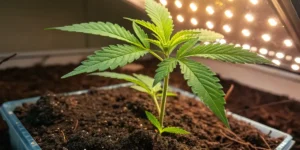The cycle of nature is fascinating, especially when you see how a worm is feeding on dead plant matter. When growing cannabis, understanding this process can offer insights into enhancing your soil’s health. Worms play a crucial role in breaking down dead vegetation, turning it into a nutrient-rich substance that benefits your plants.
When a worm is feeding on dead plant matter, it is part of a larger process of decomposing organic matter earthworm activity. This activity not only improves soil structure but also enhances water retention. For cannabis growers, this means less need for frequent watering and a more stable growing environment. Strains like Purple Kush or Super Boof from Global Green Genetics thrive in such enriched soil.
Recommended Strains
White Tahoe Cookies Autoflower
|
|
THC | 24% - 25% (High) |
|
|
Lineage | The White x (Tahoe OG x Girl Scout Cookies) x Ruderalis |
|
|
Type | Autoflowering |
|
|
Height | 3.28 ft | 1 m |
|
|
Yield | Low |
|
|
Yield Indoor | 0.66 oz/ft² | 200 g/m² |
|
|
Yield Outdoor | 14.11 oz/plant | 400 g/plant |
|
|
Life Cycle | 8 - 10 weeks |
|
|
Phenotype | 70% Indica / 30% Sativa |
|
|
Effects | Creative, Happy, Relaxed |
|
|
Flavors | Diesel, Herbal, Woody |
Bubble Kush Auto
|
|
THC | 16% - 17% (Medium) |
|
|
Lineage | Bubble Gum x O.G. Kush x Critical Automatic |
|
|
Type | Autoflowering |
|
|
Height | 3.94 ft | 1.2 m |
|
|
Yield | Low |
|
|
Yield Indoor | 1.15 - 1.31 oz/ft² | 350 - 400 g/m² |
|
|
Yield Outdoor | 4.23 - 6 oz/plant | 120 - 170 g/plant |
|
|
Life Cycle | 10 - 11 weeks |
|
|
Phenotype | 60% Indica / 10% Sativa / 30% Ruderalis |
|
|
Effects | Sleepy, Relaxed |
|
|
Flavors | Citrus, Earthy, Fruity, Pepper, Pine |
Worm digestion of plant debris involves breaking it down into simpler compounds. This process releases nutrients back into the soil, making them accessible for plant uptake. The earthworm nutrient recycling process is an essential part of maintaining a lush and productive garden. If you’re growing strains like White Widow, the improved nutrient availability can lead to healthier plants and, ultimately, a better yield.
Benefits of Worm Activity in Cannabis Cultivation
Worms are nature’s recyclers, turning dead plants into valuable nutrients. Their activity in your cannabis garden can lead to impressive results. By improving soil health and worm decomposition, your plants receive a steady supply of nutrients. This is particularly beneficial for cannabis strains like Blue Dream, which can be found at Global Green Genetics.
Additionally, worms help in aerating the soil. As they move through the ground, they create channels that allow air and water to penetrate deeper. This aeration is vital for root health and can prevent problems like root rot. For a grower, having an active worm population means a less compacted soil structure, promoting robust plant growth.
Integrating worms into your cannabis cultivation can also enhance microbial activity in the soil. Microorganisms thrive in environments where worm activity is prevalent, aiding the decomposing organic matter earthworm activity. This symbiotic relationship further enriches the soil, making it a more hospitable environment for cannabis plants.
Moreover, worms breaking down dead vegetation contribute to a more balanced ecosystem in your garden. They form an integral part of the food web, supporting various forms of life that benefit cannabis growth. By understanding this interconnectedness, growers can create a more sustainable and productive growing environment.
How Worms Enhance Soil Health
Soil health and worm decomposition are closely linked. Worms consume dead plant material, which is then broken down in their digestive system. This digestion process transforms the material into nutrient-rich castings. These castings are an excellent natural fertilizer, providing essential nutrients like nitrogen, phosphorus, and potassium.
Earthworm activity also influences soil pH. Worms help to neutralize pH levels, creating an ideal environment for cannabis growth. This is particularly important for strains that are sensitive to pH fluctuations, such as Northern Lights. Consistent pH levels mean that your plants can absorb nutrients more efficiently, leading to healthier growth.
Worms play a crucial role in enhancing the soil’s organic matter content through their digestion processes. As a worm is feeding on dead plant matter, it contributes to the organic matter levels, improving soil texture and fertility. This is crucial for maintaining a thriving cannabis garden, as plants rely on nutrient-rich soil for optimal growth.
Worms also aid in the earthworm nutrient recycling process, where nutrients are cycled back into the ecosystem. This continuous cycling ensures that the soil remains fertile and supports successive plant generations. By maintaining a healthy worm population, growers can ensure long-term soil productivity and plant health.
Choosing the Right Worms for Your Cannabis Garden
Not all worms are created equal when it comes to cannabis cultivation. The most beneficial species for decomposing organic matter earthworm activity are red wigglers and nightcrawlers. These worms are efficient at breaking down organic material and producing nutrient-rich castings.
Red wigglers are particularly effective in composting setups. They thrive in decaying plant matter and are easy to manage. Their small size allows them to work through compost piles quickly, turning waste into valuable soil amendments. For cannabis growers, red wigglers can be a simple addition to enhance soil fertility.
Choosing the right type of worm involves understanding your garden’s specific needs. Red wigglers excel in surface decomposition and are ideal for compost bins, while nightcrawlers are better suited for deeper soil aeration. By selecting the appropriate species, growers can maximize the benefits of worm activity in their cannabis gardens.
Incorporating worms also means considering their living conditions. Both red wigglers and nightcrawlers require a moist environment with plenty of organic material. Ensuring these conditions are met will allow these worms to thrive and contribute significantly to the soil health and worm decomposition process.
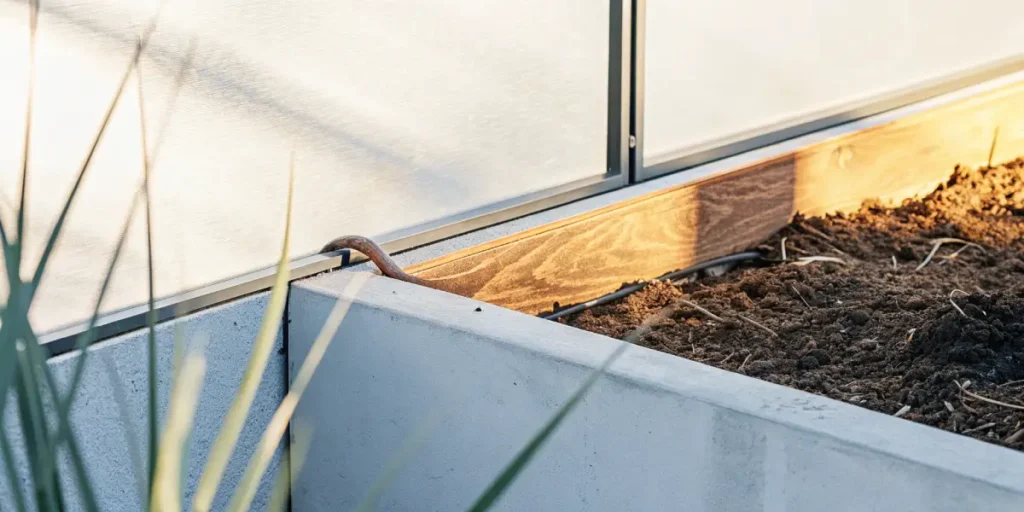
Integrating Worms into Your Growing Setup
Integrating worms into your cannabis garden is a straightforward process. You can start by adding a small population to your soil or compost bin. Ensure that there is plenty of dead plant material for them to feed on. This will keep them active and productive, contributing to the worm digestion of plant debris.
Monitoring worm activity is essential. Healthy worms mean a healthy soil environment. Look for signs of active worms, such as visible castings or worms near the soil surface. If you notice a decline in worm activity, it may be necessary to adjust the moisture levels or add more organic material.
When introducing worms, it’s important to gradually acclimate them to their new environment. Sudden changes in conditions can stress the worms, reducing their effectiveness in breaking down organic matter. By slowly integrating them, you ensure that they remain active and beneficial to your cannabis garden.
Regularly checking the balance of organic material and moisture levels is crucial for sustaining worm populations. Too much or too little of either can affect worm health and activity. By maintaining the right conditions, growers can ensure that worms continue to play a vital role in the earthworm nutrient recycling process.
Real-Life Examples of Worm Integration
Many cannabis growers have successfully integrated worms into their cultivation practices. For instance, a grower in California reported a 20% increase in yield after introducing worms into his garden. The worms helped improve soil structure and nutrient availability, benefiting his crop significantly.
Another example comes from an indoor grower using a hydroponic setup. By adding worm castings to the growing medium, he noticed healthier root development and increased plant resilience. The natural nutrients from the castings provided a balanced diet for his cannabis plants.
In another case, a grower in Oregon implemented a worm-based composting system. By utilizing worms breaking down dead vegetation, he was able to reduce waste and enhance his soil’s nutrient content. This sustainable approach not only boosted his cannabis yield but also contributed to a more eco-friendly growing practice.
Similarly, a small-scale grower found success by using worms to manage soil health and worm decomposition. By focusing on the decomposing organic matter earthworm activity, he was able to maintain a thriving garden with minimal chemical inputs. This approach highlights the versatility and effectiveness of using worms in various growing setups.
Worms and Cannabis Strains
Different cannabis strains can benefit from worm activity in various ways. For instance, strains with dense foliage like Blue Dream require ample nutrients to support their growth. Worms can provide these nutrients consistently, leading to more robust plants.
Strains with high nutrient demands, such as Purple Kush, also benefit from worm activity. The continuous supply of natural fertilizers helps meet the nutritional needs of these demanding plants. As a result, growers can expect higher yields and better quality buds.
Strains that are sensitive to environmental changes, like Northern Lights, thrive in stable conditions provided by worms breaking down dead vegetation. The consistent nutrient supply and improved soil aeration help these plants grow more resiliently, reducing stress and enhancing overall health.
Autoflowering strains, including White Widow, also gain advantages from worm integration. Due to their rapid growth cycle, a steady nutrient supply is critical. Worms assist in maintaining optimal soil conditions, ensuring these strains develop fully without the need for constant intervention.
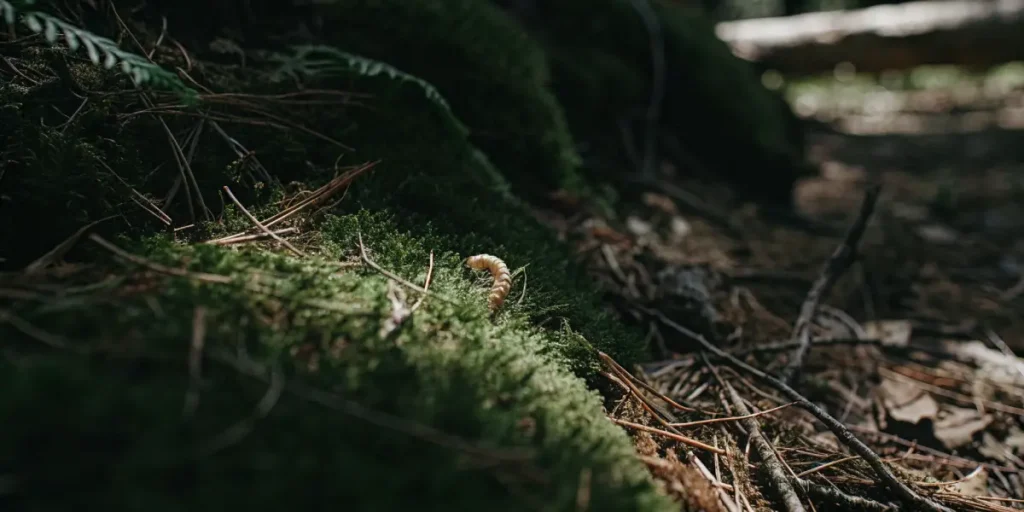
Frequently Asked Questions
How do worms affect cannabis plant growth?
Worms positively impact cannabis plant growth by enriching the soil with nutrients. As worms break down dead vegetation, the resulting castings provide essential elements like nitrogen and potassium. These nutrients are crucial for cannabis development, leading to healthier plants.
Additionally, worm activity improves soil aeration. This allows roots to access oxygen more easily, promoting stronger growth. With better root systems, cannabis plants can absorb water and nutrients more efficiently, resulting in increased yields.
Through worm digestion of plant debris, the soil becomes more fertile and structured, enhancing water retention and root penetration. This leads to a more resilient plant capable of withstanding various environmental stresses. The natural fertilization process from worms also reduces the need for chemical inputs, promoting organic growth.
Moreover, worms contribute to the earthworm nutrient recycling process, ensuring that essential nutrients are continuously available to the plants. This nutrient cycling supports vigorous growth and can significantly improve the quality and yield of cannabis crops.
Can worms survive in an indoor cannabis grow setup?
Yes, worms can thrive in an indoor cannabis grow setup, provided certain conditions are met. Indoor environments need to maintain adequate moisture levels and have a consistent supply of organic matter. These conditions are crucial for worms to survive and function effectively.
Growers can introduce worms into soil-based indoor gardens or use worm castings in hydroponic systems. Both methods have shown success in enhancing plant health and growth. Monitoring and adjusting environmental factors ensures the worms’ continued productivity.
Indoor growers must also ensure that the temperature and humidity levels are suitable for worms. Extremes in these conditions can hinder worm activity and survival. By creating a balanced indoor environment, growers can leverage the benefits of worms breaking down dead vegetation effectively.
Incorporating worms into indoor setups also requires attention to the growing medium. Ensuring that there is sufficient organic matter for a worm is feeding on dead plant matter will keep worms active and beneficial. Proper care of these factors can lead to a thriving indoor cannabis garden.
What type of worms are best for cannabis cultivation?
The most effective worms for cannabis cultivation are red wigglers and nightcrawlers. These species are known for their ability to break down organic matter efficiently, producing nutrient-rich castings. Red wigglers, in particular, are popular for composting and soil amendment.
Nightcrawlers are also beneficial, especially in outdoor gardens. They burrow deeper into the soil, promoting aeration and improving drainage. Both types of worms can coexist, offering a balanced approach to enhancing soil health.
Red wigglers are ideal for surface-level decomposition, making them perfect for composting setups where decomposing organic matter earthworm activity is needed. Their efficient decomposition process helps maintain a nutrient-rich compost pile for cannabis plants.
On the other hand, nightcrawlers are well-suited for deeper soil environments. Their burrowing activity improves soil aeration and drainage, essential for maintaining robust root systems. Together, these worms provide comprehensive benefits for cannabis cultivation.
How do worm castings benefit cannabis plants?
Worm castings are an excellent natural fertilizer, providing a balanced supply of nutrients essential for cannabis growth. Rich in nitrogen, phosphorus, and potassium, they promote vigorous plant development and enhance root strength.
Using worm castings can lead to more resilient plants, better able to withstand stress and pest attacks. They also help maintain soil structure and improve water retention, reducing the frequency of watering needed and supporting sustainable cultivation practices.
Worm castings also enhance soil microbial activity, which in turn supports the worm digestion of plant debris. This microbial boost leads to healthier soil ecosystems, providing a more supportive environment for cannabis plants to thrive.
Furthermore, the application of worm castings can reduce the need for synthetic fertilizers, aligning with eco-friendly cultivation practices. The natural nutrient profile of worm castings is balanced and readily available for plant uptake, promoting healthier growth and better yields.
Are there any drawbacks to using worms in cannabis cultivation?
While worms offer numerous benefits, there are a few considerations to keep in mind. Overpopulation of worms can lead to increased competition for resources, potentially impacting their effectiveness. Regular monitoring and management are required to maintain a balanced worm population.
Also, worms require specific environmental conditions to thrive. If these conditions aren’t met, they may not survive or contribute effectively to soil health. Ensuring the right moisture levels and a steady supply of organic matter is crucial for successful worm integration in cannabis cultivation.
Another potential challenge is managing worm populations in confined spaces, such as indoor setups. Worms need adequate space to move and process organic material. Overcrowding can hinder their activity and the overall earthworm nutrient recycling process.
It’s also important to consider the potential introduction of pests when integrating worms. Ensuring that the organic material is free from contaminants can prevent pest issues. With careful management, the benefits of using worms in cannabis cultivation far outweigh these challenges.

